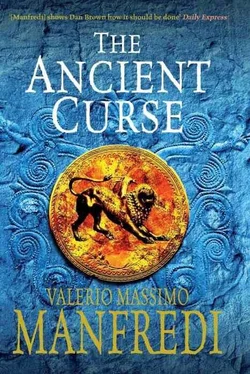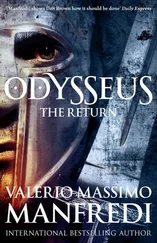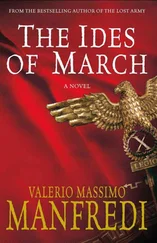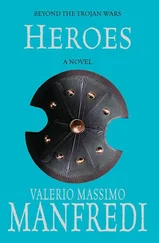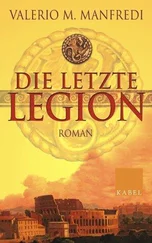Fabrizio couldn’t have said how much time had passed since he’d concluded his conversation when the phone rang. He started and grabbed the receiver.
‘It’s an ará ,’ said Aldo Prada on the other end of the line. His tone was a mix of irony and uneasy awe. ‘An imprecation… a curse that is… But that’s not all…’
‘Yes, that’s what I thought, but I wanted your verdict.’
‘I have no doubts. It involves the ritual of a Phersu if I’m interpreting correctly. Crazy stuff.’
Deeply unnerved, Fabrizio fell silent.
‘You’re already on to this, aren’t you?’ insisted Prada.
‘Yeah, I am,’ admitted Fabrizio. ‘I excavated the tomb.’
‘Of a Phersu? Holy Christ. I can’t believe you’re telling me this.’
‘It’s complicated. Very complicated.’
‘If I weren’t so far away I would rush over there and force you to explain the whole story. If you let me read the entire inscription I could be of much more help to you. I give you my word of honour that I won’t tell a soul.’
‘I am sorry, Aldo, I can’t take any risks. Consider that Balestra has been locked up in his office for weeks. If it comes out that I’m working on the same stuff…’
‘Right. Got you. That’s what I thought.’
‘You’d end up confiding in someone you trust blindly, I know you – and then he would turn round and talk to someone he trusts blindly. In two days’ time, everyone and their mother would know about it and that would mean big trouble. Bigger trouble than you can even imagine. Please, just send me your conclusions and don’t ask me any more questions. You’ll understand why soon enough.’
Prada stopped insisting and sent Fabrizio the passages that he had interpreted with the acumen and brilliance that made him one of the top scholars in his field.
As Fabrizio began to insert the phrases interpreted by his colleague in the gaps still scattered throughout his translation, he realized that his energy levels were totally depleted. He knew he couldn’t stop yet and he swallowed another amphetamine to force his exhausted brain to bear up under the strain and get the job done. Thus, little by little, an hour at a time, a story began to emerge from the shadows of millennia. A cruel, delirious story that projected a desire for revenge so burning and intense that it could span the centuries. A story that cut him to the quick and filled him with fear and despair. He looked up from his work to contemplate the image of the lad of Volterra and it was like seeing him for the first time, as if, finally, he had met up with him on a deserted road after a long, strenuous journey, or as if he had recognized a son or a younger brother he never knew he had, and Fabrizio’s bloodshot eyes were dimmed with tears.
He was certain of having concluded his work and he got to his feet with the intention of having a shower and then calling Lieutenant Reggiani or trying to locate him wherever he was. He took a few steps but his legs gave way and he slowly collapsed on to the mat that covered the floor. He couldn’t have known that evening was falling again, an early, chalky dusk shot through with shudders of wind.
His body was completely motionless and the flickering reflection of the computer screen cast a spectral light on to his face. He would have looked like a dead man, were it not for the continuous rapid movements behind his closed eyelids, as in the most intense, most visionary phase of a dream…
The room was vast, rectangular in shape and adorned with frescoes that depicted scenes from a symposium, with guests laughing, drinking, leaning forward in conversation. A double row of candelabra with hanging lamps of bronze and translucent onyx lit up the room, so numerous that they filled the hall with an intense, golden light, like that of the sunset just passed. The dinner guests – men and women, young and old – were reclining on couches alongside tables filled with trays of food and cups brimming with wine, chatting amiably in low voices.
In the middle of the room lithe maidens danced gracefully to the sound of flutes and string instruments played by a little group of musicians. The atmosphere spoke of pleasure and celebration, of the refined amusements of an aristocratic gathering, similar, perhaps, to an assembly of immortal divinities.
Next to each one of the noble ladies participating in the banquet was an alabaster perfume jar hanging on a thin cord from the ceiling, filled with rare scents imported from the Orient. Every so often one of them dipped in her hand to spread the fragrance on her soft, white skin, her round shoulders, her breasts. The perfume saturated the air, along with the light, musky scent of the men’s sweat.
At the head of the triclinium hall, at the centre of the short wall, against a curtain the colour of the night sky, reclined lauchme Lars Thyrrens, lord of Velathri, the red city of the huge gates and resplendent multi-hued temples. His full head of black hair, shining with bluish reflections, brushed the collar of golden plates adorning his neck and shoulders. He wore an embroidered chlamys open at the sides of his sculpted torso, covering only his groin. His massive build, wide shoulders and brawny arms were those of a mighty warrior, of a man accustomed to conquering by force anything that aroused his desire. Any woman would have yearned to lie in his arms and often, during a banquet, when the lights had burned low, one of the ladies present would go to stretch out beside him, covered by the same mantle, ignoring her fat and tolerant husband to become acquainted with his fierce, powerful virility. Many had done so, or perhaps all of them. Except one.
It was for this reason that the eyes of the powerful lord rested avidly, insistently on Anait, the most stunning, desirable woman in the city. So intriguing that she would make even the wisest, most upright of men lose his mind, so beautiful that she had Lars Thyrrens, the most powerful of men, in her thrall. A man who had risen to power merely, or mainly, to satisfy his own desires, to satiate any craving for food or wine or rare, precious objects, any longing for a young man or maiden in the prime of youth and beauty.
But she never returned his looks. She never tired of contemplating her own husband, Lars Turm Kaiknas, a man as handsome as a god, strong, yet as gentle and sweet as a young lad. She couldn’t stop caressing his hands, his arms, his face, because he had finally returned to her after a long absence, a war campaign beyond the northern mountains, in the vast valley crossed by a great river. There, at the head of the Rasna ranks, he had fought off the hordes of blond Celtic invaders. He led the army of the league of twelve cities to the walls of Felsina, driving them onward as far as the mudbanks of Spina, a city made of wood and straw but rich with gold and bronze, defended only by the wide swamps surrounding it.
The party was in his honour and in his palace. Anait was impatiently awaiting the moment at which the guests would wander off, in which the lauchme would give the signal to end the festivities, so she could finally withdraw to the warm intimacy of their bedchamber and undress in front of her husband in the soft glow of the midnight lamp. She’d savoured the moment already in the ardour of his eyes. For Anait there was nothing else; no one else existed in the great festooned hall. The soft chatting of her dinner companions barely reached her ears, intent on listening only to the words of the man she loved, the man that she herself had chosen when, as a young girl, she had sent a servant with a message to his house, offering herself as his bride.
But the ardent glances of the lauchme did not escape the guests. Many of them were aware of the rumours that Anait’s son, young Velies, had been conceived during one of the numerous absences of her husband; that he was the son of Lars Thyrrens. A lie that had surely originated in the palace of the king himself, to induce people to believe what he could only let himself dream of. In truth, Turm Kaiknas was the city’s greatest warrior and the head of its army, so that not even the lauchme could challenge him, much less try to seduce his wife. If he wanted to take her by force, he would have to kill her husband first, a difficult, if not impossible, endeavour. Everyone loved Turm Kaiknas, for his valour, his deeds, his heroism. He would be the king of Velathri if it were up to the people.
Читать дальше
